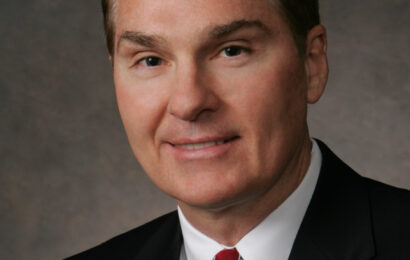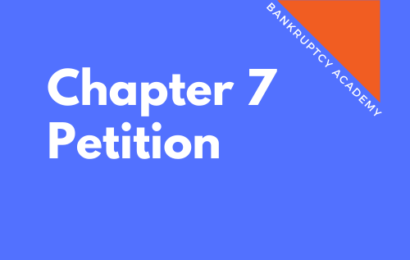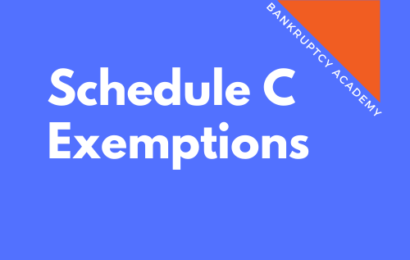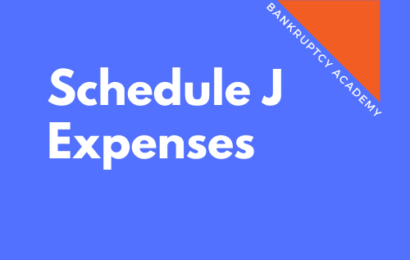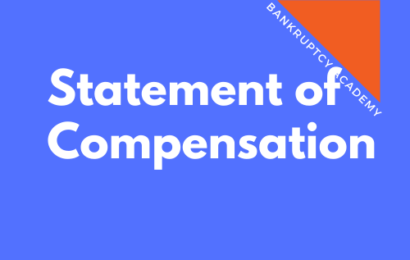Showing 1-12 of 123 results
BK 100: Welcome to Schaller Bankruptcy Masterclass
Welcome to the Schaller-Bankruptcy-Masterclass. Who Should Take These Courses? Attorneys across the nation are adding a bankruptcy practice area to their list of services to attract new clients and increase their profits. FEES CAN RANGE FROM $1,500 PER CLIENT (Chapter 7) to $5,000+ PER CLIENT (Chapter 13). Just think, one…
BK 101: Chapter 7 Petition
Chapter 7 Petition. Every individual debtor seeking Chapter 7 bankruptcy relief commences a case by filing a “petition.” 11 U.S.C. § 301. But what constitutes a petition? Unlike the U.S. district courts that giver great latitude to drafters of a civil complaint, the U.S. bankruptcy courts do not give similar latitude…
BK 102: Schedule A/B – Property
Schedule A/B: Property Every Chapter 7 debtor must file a schedule of assets that identifies both real property and personal property. 11 U.S.C. § 521(a)(1)(B)(i); Bankruptcy Rule 1007(b)(1)(A). Real property consists of land and anything permanently affixed to the land, homes, buildings, air rights above the land, and underground rights below the land. …
BK 103: Schedule C – Exemptions
Schedule C: Exemptions. Every Chapter 7 debtor is allowed, but not required, to file a schedule of exempt assets. Like the petition and Schedule A/B, Bankruptcy Rule 9009 requires a debtor to use a specific national form prescribed by the Judicial Conference of the United States when listing the debtor’s exemptions. Bankruptcy…
BK 104: Schedule D – Secured Creditors
Schedule D: Secured Creditors. Every Chapter 7 debtor must file a schedule of liabilities that includes both secured and unsecured creditors. 11 U.S.C. § 521(a)(1)(B)(i); Bankruptcy Rule 1007(b)(1)(A). This chapter focuses on the listing of secured creditors and the following chapter discusses listing unsecured creditors. The creditors listed in Schedule D are limited…
BK 105: Schedule E/F – Unsecured Creditors
Schedule E/F: Unsecured Creditors. Every Chapter 7 debtor must file a schedule of liabilities that includes both secured and unsecured creditors. 11 U.S.C. § 521(a)(1)(B)(i); Bankruptcy Rule 1007(b)(1)(A). This course focuses on the listing of unsecured creditors and the prior chapter discussed listing secured creditors. The creditors listed in Schedule E/F…
BK 106: Schedule G – Executory Contracts and Unexpired Leases
Schedule G: Executory Contracts and Unexpired Leases. Every Chapter 7 debtor must file a schedule of executory contracts and unexpired leases. Bankruptcy Rule 1007(b)(1)(C). This chapter focuses on the listing of debtor’s executory contracts and unexpired leases. What makes a contract an “executory” contract? An executory contract in the bankruptcy context has…
BK 107: Schedule H, Co-Debtors
Schedule H: Co-Debtors. Every Chapter 7 debtor must file a schedule of co-debtors (also spelled codebtor). Bankruptcy Rule 1007(a)(1). This chapter focuses on the listing of a debtor’s co-debtor. What constitutes a co-debtor? A co-debtor is one or more persons or entities that is primarily liable for the same debt for…
BK 108: Schedule I – Income
Schedule I: Income. Every Chapter 7 debtor must file a schedule of current income, commonly called Schedule I. 11 U.S.C. § 521(a)(1)(B)(ii); Bankruptcy Rule 1007(b)(1)(B). As discussed below, this statement reveals the debtor’s actual monthly income from all sources of income as of the petition date. Current income includes income from all…
BK 109: Schedule J – Expenses
Schedule J: Expenses. Every Chapter 7 debtor must file a schedule of current expenses, commonly called Schedule J. 11 U.S.C. § 521(a)(1)(B)(ii); Bankruptcy Rule 1007(b)(1)(B). Current expenses include actual expenses for rent, mortgages, utilities, food, clothing, medical and dental care, transportation, insurance, taxes, vehicle expenses, etc. Like the other schedules, Bankruptcy Rule…
BK 110: Statement of Compensation
Statement of Compensation. Chapter 7 attorney must file a disclosure of compensation for services rendered and reimbursement of expenses. 11 U.S.C. § 329(a); Bankruptcy Rule 2016(b). Like the schedules, Bankruptcy Rule 9009 requires a debtor to use a specific national form prescribed by the Judicial Conference of the United States when…
BK 111: Statement of Intent
Statement of Intention. Every Chapter 7 debtor must file a statement of intent with respect to the retention or surrender of property securing a creditor’s interest. 11 U.S.C. § 521(a)(2). For any encumbered asset debtor intends to retain, the debtor must state whether the debtor intends to reaffirm the debt or redeem the property. 11 U.S.C. §…

